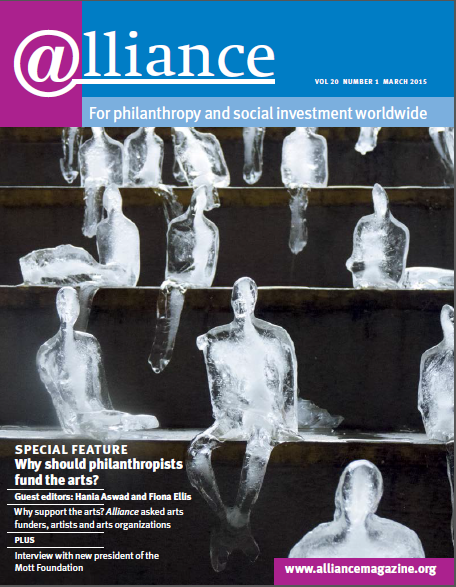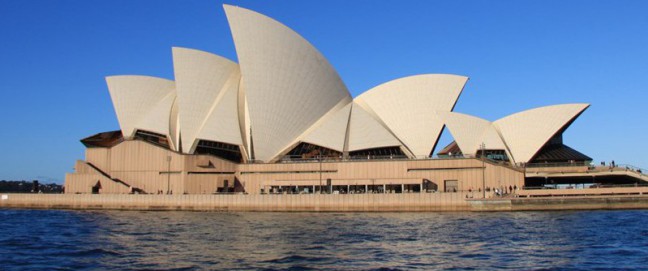Art first appeared in caves 40,000 years ago. The arts define humanity and our ability to understand, imagine, create and communicate. Art and philanthropy have been synonymous since civilization began because art is dependent upon patronage, and yet debate continues as to whether philanthropists should support art or the needs of society, as if they were unrelated.
There will always be poverty and illness. What should philanthropists do? Why should they support the arts and what can they achieve by doing so? And should they support artists or arts institutions?
I put these questions to two philanthropists, two arts leaders in the UK and a former Secretary of State for Culture.
John Studzinski, philanthropist
John Studzinski runs Blackstone Advisory Partners and is a senior managing director of the Blackstone Group. His motivation in life as well as in philanthropy is the need to respect and to preserve human dignity. He is an active supporter of The Passage, a charity for the homeless in London, where he volunteers on the front line as well as serving on the board and both giving and raising money. As a board member, he has used his international contacts to help Human Rights Watch to expand so that it can draw attention to atrocities across the world, not least in Syria and the Middle East. He is also a significant arts benefactor with a particular emphasis upon mentoring artists at the beginning of their careers:
‘I support human rights and the arts. I created the Genesis Foundation more than ten years ago. We provide funding for young artists but beyond that we actively nurture them. Genesis has supported 900 artists, one of whom, Rufus Norris, will be the new director of the National Theatre. All the causes I support come back to identity, self-worth and dignity.
‘The arts are integral to life. What drives me up the wall is the idea that they are about entertainment. Both the arts and philanthropy play a huge role in social change and always have.
‘The UK has the most open society in the world in terms of democracy, free speech and a highly critical media, and all of that is reflected in the arts. Look at the Royal Court Theatre in London. Writers from all over the world wish to write for it because free speech is one of the most precious things we have. Look at the impact that Jez Butterworth’s play Jerusalem has made. Unless we encourage that kind of writing, we won’t have the insight into contemporary society that we need to navigate our way through social change and to influence it.’
Nicholas Serota, Tate
John Studzinski is also a benefactor of Tate, the UK’s national museum of British and international modern and contemporary art. I asked Sir Nicholas Serota, Tate’s director, about the role that philanthropy plays in the arts and its significance for Tate, not least in the building of Tate Modern, the world’s most popular museum of modern and contemporary art:
‘There is an innate ambition in some people to leave the world a better place than they found it. The arts appeal to benefactors because they are an enduring part of society. We know a great deal more about the culture of the Greeks, Romans and pre-Columbians than we do about their rates of inflation.
‘Most early philanthropy was about commissioning artists, and there are examples in recent times of that kind of patronage when Robert and Lisa Sainsbury bought Francis Bacon’s paintings in the 1950s. The impact of the Sainsbury’s philanthropy is felt today.
‘My aim in building Tate Modern was to encourage people to be less frightened of the art of their time, by creating somewhere they could feel welcome, a place in which they could find solace as well as intellectual stimulation and in which artists could make work that reflects our time.
‘None of Tate’s expansion or the growth in audiences from 1.75 million to 7.75 million over 20 years would have been possible without a partnership between secure public funding – although that has declined by 30 per cent since 2010 – and philanthropy. One of our first significant donations for Tate Modern came from a man not noted for his enthusiasm for modern art. He was motivated to give because he recognized the need for London to have a museum of international contemporary art and he knew that cultural investment in a relatively poor part of London could transform the area economically and socially.
‘Philanthropists are attracted to Tate because of our ability to reach young audiences, to provide learning opportunities and to take risks with artists. Through expansion, largely funded by philanthropy, we have been able to build new audiences and create programmes for local young people, and we now have an annual membership that has grown from 30,000 in 2000 to 114,000.’
Tate has huge international appeal, particularly to the young, and attracts over 20 million online visitors a year. More people are engaged with and participate in the arts than ever before. Britain’s creative industries constitute one of the fastest-growing parts of the economy, contributing 6 per cent of GDP and employing 2 million people. The positive impact of the arts upon urban regeneration is well documented.
Alex Beard, Royal Opera House
All this represents significant social change, and I wanted to know what if any contribution has been made by music. I spoke to Alex Beard, chief executive of the Royal Opera House, regarded by some as a temple of high art:
‘The concept of high art has no currency whatsoever. What opera does best is to use all the art forms to deal with the most significant forces in life: love, death, rebirth, betrayal, power, the tension between the public and the private. These emotions are central to the human condition and opera enables us to explore them with a power and intensity that other art forms cannot quite match.
‘Of course opera is expensive but it is nonsense that you have to be rich to come here. Forty per cent of the tickets for every performance are £40 or below. Our student standby scheme has 20,000 members.
‘Access is central to everything we do. Some may not see us as agents of social change but that is what we are. Philanthropy is vital, providing 25 per cent of our annual budget. This helps to subsidize cheaper tickets but philanthropists are active in helping us to change the way we work and to change the lives of others. For example, our recent production of The Dialogue of the Carmelites, Poulenc’s opera about religious persecution in revolutionary France, engaged a community ensemble for the crowd scenes made up of the homeless, the long-term unemployed and ex-offenders. The energy they brought to the performance was phenomenal. This is outreach of a new order.
‘Our new workshop in Thurrock, close to London but one of the most deprived areas in the south-east of the UK, is part of a cluster of creative enterprises working together with a combination of public and private funding in which philanthropy has been crucial. This has enabled us to work for the public good by providing employment and skills development where they are needed. As a result, Thurrock Council has asked us to work with 22 schools to develop a programme around cultural awareness and entitlement. This kind of venture should be a model for the future.
‘Our purpose is to enrich people’s lives through opera and ballet. We must ensure that we reflect and contribute to society today. Those visionary philanthropists who support this mean that we are now playing to a whole different set of concerns that have changed the focus and character of the Royal Opera House.’
I worked in the arts as a professional fundraiser for more than 25 years and I can confirm that priorities have changed. Education and access programmes were initially on the periphery and are now centre stage. This has changed the relationship between the arts and their public. Visiting the arts is no longer simply an act of worship but also a more democratic and social experience.
And what has been the impact upon those who sang in the chorus of The Carmelites? Participants were asked if there were areas of theatrical life that interested them. Some were offered work experience. One former prisoner said: ‘I never dreamed it would work out like this. A year ago, I was in prison and had never acted in my life. In September, I will start studying at the Royal Academy of Dramatic Art.’
Victoria Robey, philanthropist
I asked Victoria Robey, a former banker and a philanthropist, for her view on the role of philanthropy in enabling music to serve society and contribute to social change. Victoria is the chairman of the London Philharmonic Orchestra (LPO) and a trustee of the Royal College of Music (RCM). She is also a founding director of London Music Masters (LMM), a music education charity undertaking pioneering work in primary schools in inner London with the involvement of the RCM and the LPO:
‘It is interesting that since the recession when most people have been worrying about having less money, attendances at cultural events have gone up. There is a need for the arts because they offer opportunities to reflect, learn and even to change. Moreover, people are united by the arts, and music is particularly powerful because it touches the lives of almost everyone through a shared language.
‘There is a thread linking music and my philanthropy. The LPO has one of the most vital education programmes in the country, working with people of all ages. At the RCM we are responsible for the musicians of the future and concerned that talented young people may study regardless of their means. However, the paucity of high-quality music education throughout the UK means that most poorer children don’t have the opportunity to learn how to play an instrument properly and have a limited prospect of developing the skills needed to go to a conservatoire. Even worse, their ability to enjoy music is unnecessarily limited.
‘By working with the LPO and with Itzhak Rashkovsky, the outstanding pedagogue and violinist, we founded LMM to pioneer good practice in music education and to transform the lives of the very young in some of the most disadvantaged areas of London.
‘We are now working in five primary schools in inner London. Professional musicians teach entire classes how to play the violin from the age of four. Our credo is excellence. We give the children music tuition of the highest standard. This is about more than social change. Children learn to concentrate, to work together, to achieve and to aspire. This approach enhances academic performance as well as improving social behaviour. The programme pulls the parents in and has a knock-on effect on the wider community. Everyone aims higher.
‘We are mostly privately funded and therefore limited in how many schools we can work with. This is frustrating when there is proof that the arts are a catalyst for social change. Our government must understand that the arts should be embedded in the education system in a more thorough way rather than as a desirable extra. Philanthropy can achieve a lot and be pioneering but by working in partnership with public funding, we could achieve so much more.’
Chris Smith, former culture secretary
No one knows more about arts funding than Lord (Chris) Smith, Secretary of State for Culture in Tony Blair’s first government and currently chairman of the Art Fund, the Donmar Warehouse and the Wordsworth Trust. He is keenly aware that the link between social change and the arts is as important to government as it is for some philanthropists:
‘As a practical politician, I could not ask the Chancellor of the Exchequer to increase funding because the arts represent beauty and truth. I had to emphasize their economic and social benefit and the need to improve access. I believed that it was my public duty to help people to enjoy the great things in life, and that led to free admission to museums and has helped to enhance the social and economic impact that arts are making in our towns and cities.
‘In the UK, a mixed economy for the arts has been crucial in their success in attracting audiences and enhancing our international reputation. The key factor is to ensure the independence of artists and cultural institutions. We have avoided plutocracy where donors influence artistic decisions. As a result, the arts are lively and challenging and this motivates audiences and donors. The arts are also fundamental to the success of our growing creative and knowledge economy.
‘Philanthropists in the UK like to be partners. We have to raise 50 per cent of our turnover at the Donmar Warehouse but this enables our small theatre to make an impact and exert an influence way beyond its size and to mount pioneering productions such as our all-female Julius Caesar.
‘Arts education and access programmes used to be a required extra but have now become integral. Look at what Vivien Duffield’s Clore Foundation has done for arts education. She has helped to change the way museums and galleries think about the way they relate to the public and to the young in particular, and that is good for everyone.’
By creating and supporting cultural learning centres for 50 years, and insisting that learning should be a priority, Vivien Duffield has changed practice. And by doing so, she has also helped to change the lives of thousands of young people.
Art and society should be inextricably linked in liberal democracies as art is the ultimate expression of freedom. By supporting both artists and arts institutions, philanthropists also serve society. We must feed the hungry, give shelter to the homeless and care for the sick. However, if we fail to nourish the soul and stimulate the intellect, we are lost.
John Nickson was formerly head of fundraising for the British Council, English National Opera, the Royal Academy of Arts and Tate. He is a philanthropist, a charity trustee and the author of Giving Is Good For You. Email johndnickson@gmail.com
Lead image: Tate Modern and the Millennium Bridge. Photo by Bernard Gagnon.









Comments (1)
very informative and lightening , specially for me who is a art student and wishes to create a better world through art . thank you ! Totally worth of read .